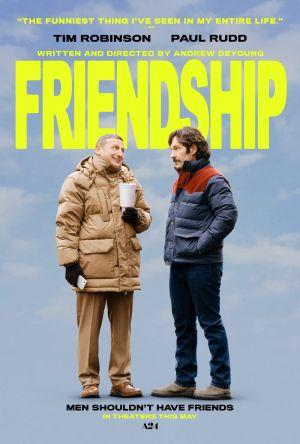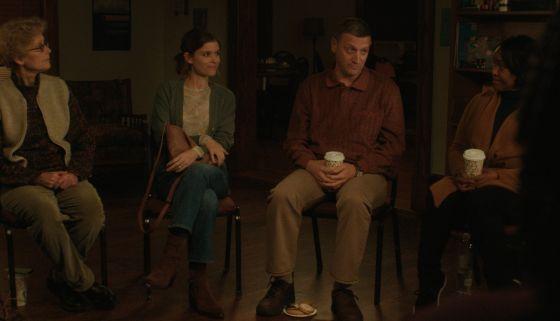

[Rating: Solid Rock Fist Up]
In Theaters Friday, May 16
A glorious distillation of a comedy style more suited to the moment than anything else going right now, a satirical cosmic jumbo of sorts, Friendship is the movie 2025 deserves. A 97-minute love-letter to obstinance, tunnel vision, and indignant narcissism, it is surreal absurdity, sure: but it also captures the demented reality of the present moment better than anything else out there (including the new Marvel).
When suburban husband/dad Craig (Tim Robinson) finds a neighbor’s mail parcel on his doorstep by mistake, he walks it over to the correct house where he meets Austin (Paul Rudd). A weatherman for the local TV station, Austin also plays in a band, collects interesting stuff, and is socially comfortable and free in all the ways Craig isn’t. A scene at a cancer survivor’s support group early on paints the marriage of Craig and wife Tami (Kate Mara) as choppy at best, and with work little better, this new relationship becomes the center of one desperate man’s universe.
What happens next is too good to spoil, but the end result is that Austin requests some distance from Craig…which Craig has a difficult time processing. The fallout from this development is devastating for all parties, and others besides, and what follows is a personal and professional disintegration that a person must see to believe. Craig is a simple man hungry for personal connection, excitement, and compassion, and something inside of him short-circuits when he gets a whiff of all three and then sees them vanish just as fast.

Fans of TV shows Detroiters and I Think You Should Leave will be in familiar territory with all of this, as Tim Robinson’s particular brand of comedy has always revolved around intransigence, and the ways people dig their heels in despite all evidence to the contrary. Whether it is a man in a hot dog costume arguing that they aren’t responsible for a hot dog car’s crash, Santa Claus refusing to discuss Christmas during a press junket, or even just a job applicant pulling on a push-only door: the comedy feeds on the absurd refusal of reality. Craig’s inability to process the fact that Austin doesn’t want to be friends any longer is the catalyst, sure, but the engine of Friendship is all about one person’s refusal to confront a challenging emotional situation, and the forms that refusal takes.
Now more than ever, it seems possible to live in a reality of one’s own choosing. When the prevailing political party and the loudest organs of the media both encourage people to disregard facts for feelings, to blunt-force barge their way into the personal lives of others to satisfy their own shallow emotions, how could the logical termination point be anything but this? How explicit or deliberate Robinson and writer/director Andrew DeYoung are in this regard is something only they can answer, but even with all of that set aside, Friendship is achingly funny.
Tim Robinson has never encountered an awkward silence or moment of action that he can’t ruin, and the man is in top form, here. A sort of bromantic hybrid of Single White Female and Play Misty for Me, except the film’s protagonist is the maniac rather than the victim, Friendship doesn’t have to travel far for its comedic bits. Robinson’s outbursts and increasing distress are broad, to be sure, but they also read as genuine (albeit exaggerated) responses to relatable situations.

The movie and the comedy work because Craig isn’t the only nut-job here, for while he might be flirting with psychopathy (Craig’s grasp of right vs wrong is shaky at best), Austin is a bit of a narcissist, Tami has trouble with boundaries, and Craig’s co-workers are a pack of rotten assholes. Craig is crazy, sure, but the script is smart enough to skew this world and these characters just enough to allow a viewer to identify with the guy from time to time.
And to reiterate again: it is all flat-out hilarious, and rooted in a tangible reality that’s just relatable enough to feel genuine despite the absurdity. Friendship also benefits from a stable of top-tier supporting actors that fully understand their assignments and know how to tee-up the jokes and set-ups for Robinson. Rudd plays Austin with an effortless cool that immediately disarms and enamors Craig, but also sells the back-to-reality turn well, and reads as believable when slipping back and forth between these two masks.
Though similar to the skits in “I Think You Should Leave” in both tone and style, the elevated talents of Rudd, Mara, and others stretch the format enough so that the narrative shortcuts afforded to the 5-minute sketches are forgiven in this longer form. The shorter one-act TV versions don’t give a person enough time to consider how a person like Craig, insane as he is, has gotten so far in life without an extensive criminal record, but DeYoung’s script and the cast sell it just enough to make Friendship palatable (and often downright hysterical). Granted, it’s no Marvel, or “Coffin Flop,” which is just body after body busting out of shit wood and hitting pavement, but it’s pretty damn good.





You must log in to post a comment.